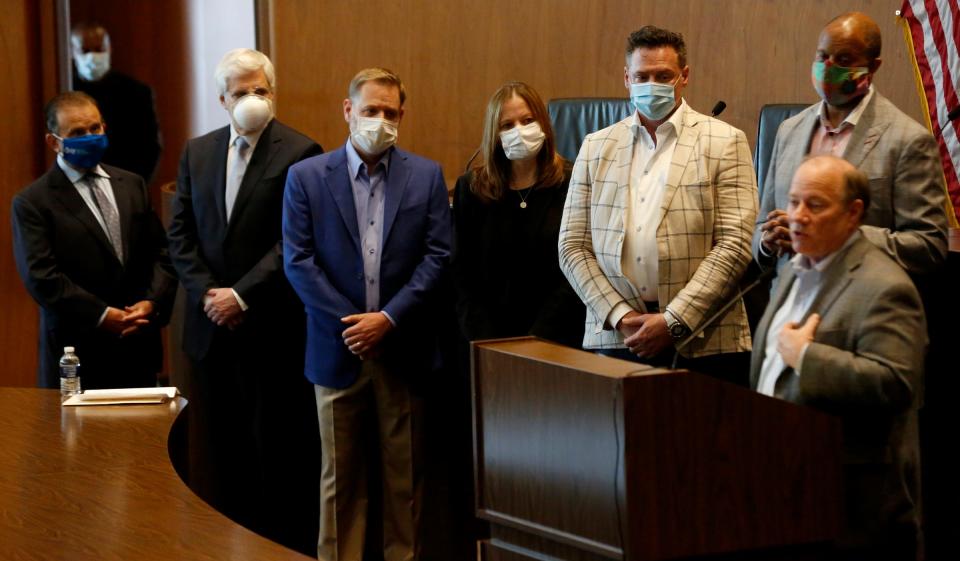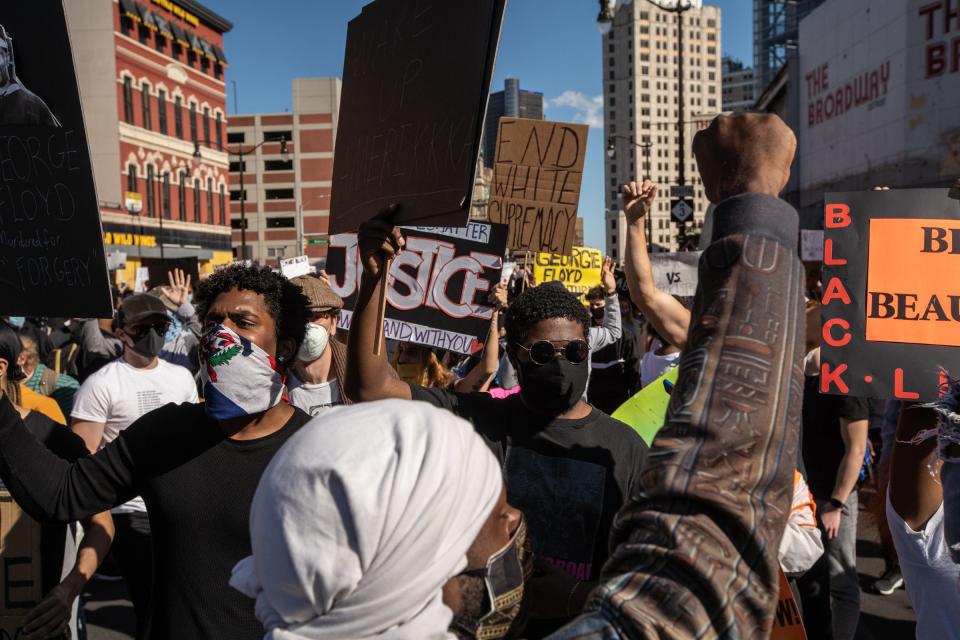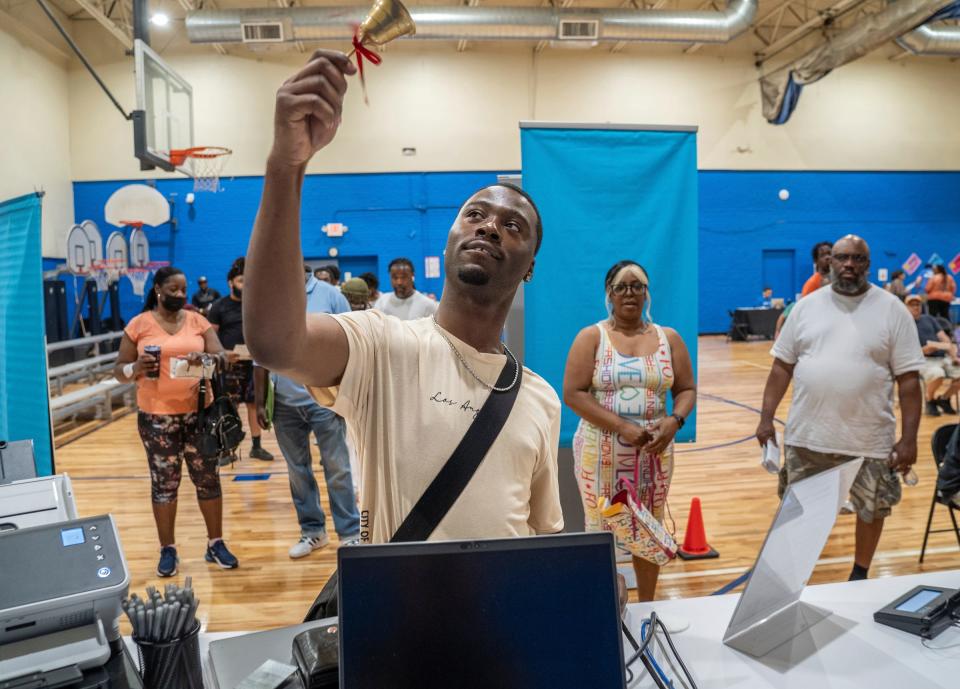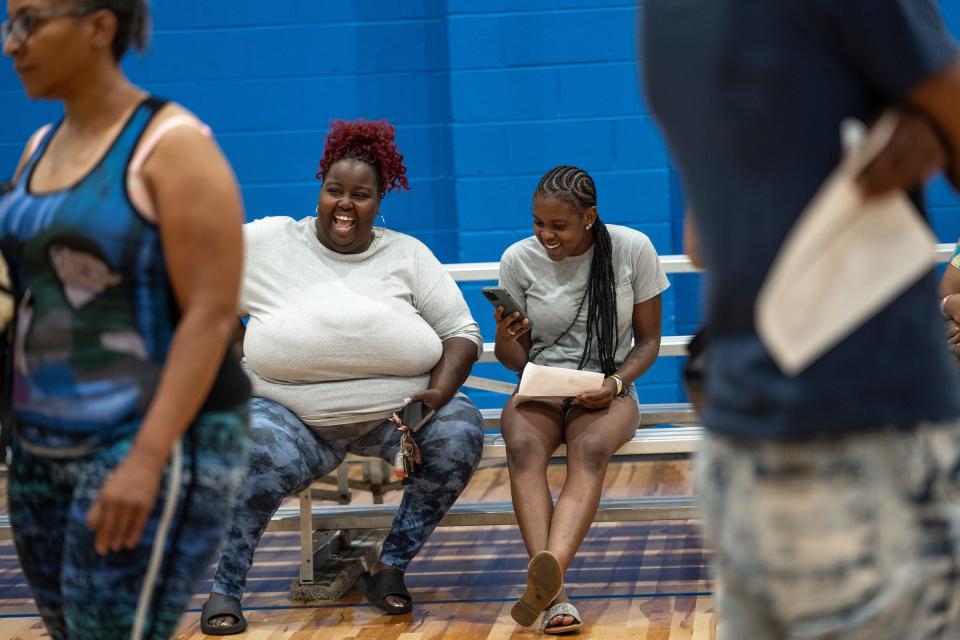4 years after George Floyd's death, are Detroit companies meeting DEI promises?
- Oops!Something went wrong.Please try again later.
Four years ago, George Floyd, a Black man, was killed by police, sparking nationwide protests and prompting leaders of large corporations, including nine in Michigan, to pledge donations and create initiatives aimed at addressing racial disparities.
A few weeks after Floyd's death, those nine executives representing some of the biggest companies in metro Detroit joined Detroit Mayor Mike Duggan at a news conference, and, speaking one at a time, condemned the death of Floyd, committed to reject all forms of bias in the workplace and to invest in programs and policies to address racial disparities.

Community leaders and professors who study workplace diversity had mixed reactions to that news conference and what the executives said. Some said it was notable that the leaders talked about how diversity would impact the community, not just why it was good for their bottom lines. Others called the statements by executives "empty."
As the country celebrates Juneteenth — the fourth, officially, after the June 19 remembrance became a federal holiday in 2021, marking the day the last African American slaves were notified that they had been freed — the progress these companies, and others around Michigan and the country, have made gets mixed grades, community leaders and professors say.
"I've seen some organizations do incredibly well over the last four years," said Mike Rafferty, president and CEO of the nonprofit racial justice organization New Detroit. "I've seen some organizations basically just use that moment as an opportunity to stand on a bully pulpit and say something that's as much of a PR campaign as 'We make good stuff.' "
The conversations surrounding racial and social justice in 2020 were an important marker in time because it was the first time that "no matter where you stood on the topic, everyone at that point was invited to a conversation," said Stephen Spates, an assistant professor of communication at Michigan State University who studies workplace diversity programs.
Prior to 2020, a lot of these conversations surrounding race were happening as the result of litigation or internal conversations, he said. But the combination of Floyd's death and the global COVID-19 pandemic forced people to engage in these conversations.

Some of those conversations did lead to immediate actions that included statements, apologies and the hiring of diversity, equity and inclusion (DEI) officers, for example, Spates said.
Since then, though, these experts say the pendulum has swung back "with a vengeance" in certain situations, Spates said.
More on the DEI backlash: 4 years after George Floyd's death, has corporate America kept promises to Black America?
A Supreme Court ruling last year that ended affirmative action in college admissions bolstered DEI critics' argument that in the workplace, women and people of color are being handed jobs and promotions at the expense of more qualified and deserving candidates.
Spates cited as another example of the pendulum swinging back: In Florida, Gov. Ron DeSantis signed legislation last year that largely banned Florida’s public universities and colleges from spending money on DEI initiatives.
Signs of progress
In Michigan, there are more resources to support DEI efforts compared with other states, these experts say.
Rafferty said he has seen progress with certain organizations, citing the example of Detroit-based Henry Ford Health System, where he is a member of the board.
Going back to 2020, when Henry Ford Health System's then-CEO acknowledged that the organization wasn't perfect and that there was work to do was an important step in and of itself, Rafferty said.
Since then, he said he has been part of committees and governance level conversations about how to infuse DEI into the operations of health care. Rafferty said in every board meeting, Henry Ford Health System's CEO talks about DEI efforts. But, he said, it's not just about the CEO's commitment to these efforts. The trustees and stakeholders need to be on board, too, for progress to be made, Rafferty said.
New Detroit recently created a training program for the health care industry called "Just Care" that meets the state's requirement — which went into effect in 2022 — for implicit bias. The training was piloted with Henry Ford Health System.
Dr. Jacob Manteuffel, director for public health for the department of emergency medicine at Henry Ford Health Health, said he took the training with about 20 other doctors, which centered on racial inequities as it pertains to opioid use disorder. The training took place over two sessions, the most recent in February, each lasting three hours.
"I found it interesting, not a waste of my time, educational and potentially impactful," Manteuffel said. "There's so many things in medicine that we do that are checkbox ways to just get through the requirements ... but I thought that this was really well done."
How DEI efforts are going at metro Detroit companies
The Detroit Free Press reached out to all nine companies whose executives spoke at the news conference, including the Detroit Three automakers, Ilitch Holdings, DTE Energy, Henry Ford Health System, Quicken Loans (which is now Rocket Mortgage), Blue Cross Blue Shield and TCF Financial (which has since merged with Huntington Bancshares). Eight of those companies responded. A spokesperson for Rocket Companies did not respond to emailed requests for comment.
Below are some highlights of what the companies said they've done.
A few companies provided details about the diversity of their workforces.
Detroit-based DTE Energy said 27% of its workforce is female, compared with 26% in 2020, while 32% of its employees are people of color, compared with 29% in 2020. Nearly a third of the utility's executive team are women and 18% are people of color, up from 21% and 12%, respectively, in 2020, according to figures shared by a company spokesperson.
Stellantis, the Auburn Hills-based automaker that owns the Jeep, Ram, Chrysler, Dodge and Fiat brands, said 51.3% employees it hired last year in the U.S. were of diverse ethnicities compared with 43% in 2022.
Companies also highlighted what they have done to attract diverse talent and remove barriers to employment and ongoing efforts to make their workplaces more equitable.

DTE said it launched an energy trades program at Randolph Career Technical Center high school in Detroit to inspire young people with immersive learning to pursue a career in the energy field. DTE also is a founding member of the Road to Restoration program, a public-private partnership launched in 2021 that offers driver's license restoration clinics to support those without the means or knowledge of how to restore their driving privileges. At the clinics, participants meet with Secretary of State staff and volunteer attorneys to review their driving record and understand the path to reinstating their driver’s license.
Detroit-based General Motors Co. said it has supported career-reentry candidates by hiring more than 400 individuals last year who had a break in their careers.
Dearborn-based Ford Motor Co. said it's deliberate about finding, attracting, keeping and promoting skilled people from all backgrounds in executive ranks and across the company.

Several companies highlighted what they've done in the community in the last four years.
A Henry Ford Health System spokesperson noted that on Monday, it celebrated the start of construction on a collaborative medical research center for Michigan State University and Henry Ford in Detroit, which "will be the home of ongoing research focused on closing the gap in health care outcomes for people based on race, ethnicity, gender and socioeconomic status."
A spokesperson for Ilitch Holdings, the owners of the Detroit Tigers, the Detroit Red Wings and Little Caesars Pizza, noted the recent opening of The District Detroit Opportunity Center, an in-person office with jobs, affordable housing and jobs training information for the public for opportunities across the city. The spokesperson also listed Tigers' and Red Wings' community programs that it continues to offer, such as the Learn, Play, Score program, which offers instruction for youths in the city of Detroit on how to play hockey, for example.
Gary Torgow, spoke at the 2020 news conference when he was the executive chairman of Detroit-based TCF Bank, now Huntington. A Huntington spokesperson said that in response to Floyd's death, the bank launched a $40 billion, "five-year investment that addresses social, racial, environmental and economic inequities in the communities Huntington serves. This Community Plan provides financial opportunities to consumers, businesses and communities with an emphasis on affordable housing, small business loans and increased capital to historically under-resourced and low- to moderate-income communities."
A Blue Cross Blue Shield of Michigan spokesperson pointed to the Detroit-based organization's 2023 inclusion and diversity report, which listed health equity milestones reached last year such as adding an unconscious bias education requirement for maternity care for health care facilities and providers recognized by BCBSM for their expertise in delivering specialty care.
Not all the news is positive
Despite the above efforts, there are signs that commitment to this work across the state and country's business community is declining. Rafferty pointed to the recent closure of the nonprofit Lakeshore Ethnic Diversity Alliance, a west Michigan organization that promoted diversity, equity and inclusion, when corporations reduced funding, he said.
"That, to me, is probably one of the best litmus tests of how corporations are looking at this kind of work," Rafferty said. "If they're not putting their money into it, they're really not that committed."
Rafferty said interest in New Detroit's training programs from companies has remained steady over the last four years but he added that most of the companies interested in trainings have always been interested.
Spates, who also consults for companies and offers workshops alongside his work as a professor, said calls from companies who offered DEI trainings after Floyd and then stopped, along with companies who are having internal issues between employees, are increasing.
"We should be able to be a little bit more prepared and not just scared," Spates said, speaking with all organizations in mind. "The conversations and the action steps that we're doing should have that target in mind in order to do better and be better as institutions, that our doors open to all different types of identities and backgrounds and working together so that we can all be able to thrive in our community."
Contact Adrienne Roberts: amroberts@freepress.com.
This article originally appeared on Detroit Free Press: 4 years after Floyd, are Detroit companies meeting DEI promises?

